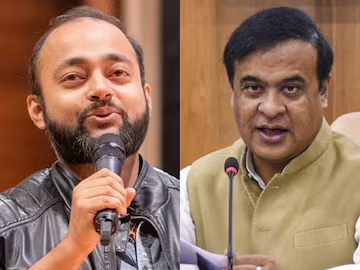Social media influencer Abhishek Kar has found himself in the midst of a heated controversy after making derogatory comments about women from Assam. His remarks, which were made during a live-streamed video, have drawn widespread condemnation across the country, leading to calls for his immediate apology and even legal action. Kar, who has a sizable following on various platforms, made the remarks about Assam women being capable of “turning men into goats,” a statement that many have deemed offensive, misogynistic, and deeply disrespectful.
The incident took place during a live session on a popular social media platform, where Kar was interacting with his audience. In the video, he appeared to be making light of the concept of traditional beauty standards and cultural practices, but his comments quickly crossed the line when he mentioned that “Assam women can turn men into goats.” The comment, which was intended as a joke, immediately sparked outrage among viewers, especially from the Assamese community, who found it to be not only offensive but also an insult to the women of the region.
The remarks did not go unnoticed, as social media users quickly began sharing screenshots and video clips of the live session, with many expressing their disgust at Kar’s words. Influencers, celebrities, and political figures joined in condemning the remarks, demanding accountability and an apology. The hashtag #AbhishekKarApologize began trending on social media, with people calling for stronger regulation of content creators and influencers who make such insensitive remarks without considering their impact.
In response to the backlash, Kar initially attempted to downplay the situation, suggesting that his words were taken out of context and that he had no intention of hurting anyone. However, this only fueled the anger of his critics, as many argued that his justification was inadequate given the nature of his remarks. The incident quickly escalated, with accusations of sexism, racial stereotyping, and cultural insensitivity being leveled against Kar.
The comments have brought to light deeper issues related to the responsibility of social media influencers in shaping public discourse. As influencers with large followings, individuals like Abhishek Kar are often seen as role models, especially by young audiences. Critics have pointed out that such comments perpetuate harmful stereotypes and contribute to the objectification and marginalization of women, particularly those from specific regions and cultures. The incident has also raised questions about the lack of accountability for influencers who make controversial statements that go unchallenged by social media platforms.
The Assamese community, both online and offline, has been vocal in demanding a formal apology from Kar. Many have pointed out that his words were not just disrespectful to women but also reflect a broader issue of regional and cultural stereotyping. Assam, a state with a rich cultural heritage and a long history of contributions to India’s diversity, has often been subjected to various forms of discrimination and misrepresentation. This latest incident only adds to the feeling of alienation and disrespect that many Assamese people feel when their culture and identity are ridiculed in such a manner.
Legal experts have also weighed in on the matter, suggesting that Kar’s comments could be subject to legal scrutiny under India’s laws related to hate speech and defamation. While the law provides protection against harmful and derogatory remarks, the question of how to balance freedom of speech with the need to prevent hate speech and online harassment remains a complex issue. In this case, the lack of immediate action from social media platforms in removing the video has raised concerns about the effectiveness of current regulations governing online content.
As the controversy continues to unfold, the pressure on Kar to issue a public apology has been mounting. Many social media users are demanding that he take responsibility for his words and acknowledge the hurt they have caused. Some have even called for a boycott of Kar’s content, urging sponsors and brands that collaborate with him to reconsider their associations. The incident has also led to a broader discussion about the role of social media influencers in shaping societal attitudes and the responsibility they have to their audience.
In the coming days, it remains to be seen whether Kar will offer a genuine apology or whether his actions will lead to further legal and public consequences. One thing is clear: the incident has highlighted the need for greater accountability among influencers and content creators, as well as a more nuanced understanding of cultural sensitivity in the digital age. The power of social media to amplify voices, both positive and negative, means that individuals in the public eye must be more mindful of the impact their words can have on society.


